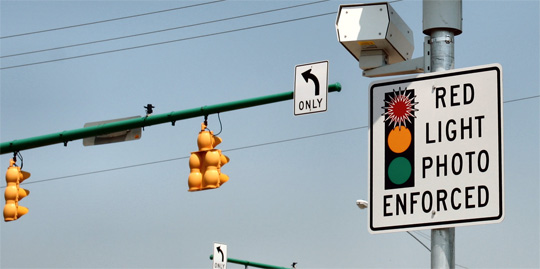Court Rules Against Cities, Red Light Cameras
June 13, 2014
Wading into the controversial issue of red-light cameras, the Florida Supreme Court on Thursday sided with motorists who challenged local red-light camera ordinances in Orlando and Aventura.
The case focused on red-light camera programs that the cities began using before approval of a 2010 statewide law that authorized the traffic devices and set requirements.
In a 5-2 decision, the Supreme Court said the cities did not comply with the state’s traffic laws at the time because of the way they enforced red-light camera violations. The cities used municipal-code enforcement systems that were different than the way state laws said traffic offenders should be punished.
 “Each of the ordinances creates a municipal code enforcement system for the disposition of red light violations that is entirely separate from the enforcement system established under (two parts of state law),” said the majority opinion, written by Justice Charles Canady and joined by Chief Justice Ricky Polston and justices R. Fred Lewis, Jorge Labarga and James E.C. Perry.
“Each of the ordinances creates a municipal code enforcement system for the disposition of red light violations that is entirely separate from the enforcement system established under (two parts of state law),” said the majority opinion, written by Justice Charles Canady and joined by Chief Justice Ricky Polston and justices R. Fred Lewis, Jorge Labarga and James E.C. Perry.
But Justice Barbara Pariente, in a dissent joined by Justice Peggy Quince, wrote that the majority opinion failed to “take into account the breadth of the home rule authority granted to municipalities by both the Florida Constitution and by statute.”
“Although this subject is of interest to many Floridians, the wisdom and public policy questions regarding the use of red light cameras are not before this court, nor are any potential constitutional issues that may be implicated through the use of these cameras,” Pariente wrote. “Instead, the only issue in this case is the purely legal question of whether municipalities were authorized to enact red light camera ordinances, which imposed municipal fines on drivers for conduct already covered by the Florida Uniform Traffic Control Law, prior to 2010, pursuant to their home rule authority.”
Red-light cameras have been heavily debated in recent years as they have been installed in cities across the state. While supporters say they help traffic safety, critics question, in part, whether the use of the devices is motivated by cities seeking more money from traffic fines.
The Supreme Court took the cases after conflicting rulings by lower courts. The 3rd District Court of Appeal upheld the Aventura ordinance, while the 5th District Court of Appeal struck down the Orlando measure.
The plaintiff in the Orlando case, Michael Udowychenko, challenged the ordinance after getting cited for running a red light in 2009. The Aventura ordinance was challenged by Richard Masone, who also was cited in 2009. The filed the cases, at least in part, to get fines set aside.
State lawmakers in 2010 approved what is known as the Mark Wandall Traffic Safety Act, the statewide red-light camera law.
But in a footnote in her dissent Thursday, Pariente wrote that the 2010 law had not made the issues in the local cases “moot, particularly given the significant amounts of money that were collected by the cities of Orlando and Aventura pursuant to their then-existing municipal ordinances — which the majority has decided must now be returned to the individuals who violated these ordinances.”
The majority opinion does not explicitly address returning money to motorists, but it upheld the decision by the 5th District Court of Appeal.
That decision said, in a footnote, that a proposed class action had been denied in the Orlando case. It also noted that only Udowychenko had challenged the ordinance and that “others who paid the fine most likely would be barred” by a legal doctrine that often prevents recoveries by people who voluntarily make payments.
by Jim Saunder, The News Service of Florida
Comments
One Response to “Court Rules Against Cities, Red Light Cameras”



and the court wont rule against the NSA recording us?????